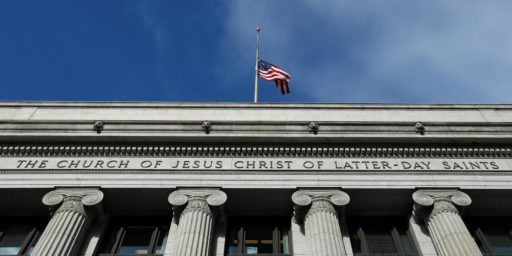Why is This Embarassing?
Kevin Drum suggests that for the following reasons Clarence Thomas is an embarassment,
Thomas is one of the few jurists today, conservative or otherwise, who understands and defends the principle that our rights come not from government but from a “creator” and “the laws of nature and of nature’s God,” as our Declaration of Independence says, and that the purpose and power of government should therefore be limited to protecting our natural, God-given rights.
….The American people need to be reminded of the source of their rights and persuaded that limited government is good; that the principles of the Constitution — which are the natural-law principles of the Declaration of Independence — are timeless, not time-bound; that without those principles, the noble ends set forth in the Constitution’s preamble can never be achieved.–source
While I’m a diehard evolutionist, I don’t see a problem with the above. That is, if it is okay for a preacher or priest to say it, as Kevin claims, why is it ridiculous for Justice Thomas? Yes, I know about the seperation of church and state and all that, but so what? Does Kevin think that because Thomas believes in a creator and that is the source of our rights that Thomas cannot understand and apply the notion of seperation of church and state?




THe problem of course is that Drum thinks rulings have a better chance of coming down on his side of the fence, with an atheist in such a position.
The natural law that Thomas espouses holds that there is a natural hierarchy in nature as created by God himself. The irony of this is that in this hierarchy Thomas is naturally inferior to white people. Our founding fathers recognized this hierarchy. That is why they were ok with slavery. And why later Americans were ok with the extermination of Indians. (The only good Indian is a dead Indian, being the commonly held belief for a majority of white Americans at one time)
An argument from natural law is dangerous because without a liberal grounding belief in the rights of man qua man a person could get sucked into the natural law arguments for racial superiority of one race over another. Good Germans fell for it. Good Americans once did and might again.
Right now it seems that Islamist are becoming the inferior stereotype race to many in America. I wonder if Thomas’s view of rights granted by natural law would extend to them as well and if these rights should be recognized in Gitmo and elsewhere.
Got anything to back that up with ken?
Yeah, Ken’s got backup from the Declaration: “We hold these truths to be self-evident: that all men are created equal, and endowed by their creator with certain inalienable rights, among these are life, liberty and the pursuit of happiness.”
Yeah. I see it all there, ken.
Steve, I am not sure what you want more information about. But first it seems I misread your post. Apparently someone else is attributing this natural law belief to Thomas. I don’t know whether he holds it or not.
But in any event natural law got its start with Aristotle and was Christianized by Thomas Aquinis (my elementary school patron saint) In mediaval days it provided justification for such institutions as the church (as the sole source of redemption) and the heridatary soveign (as the source of all civil law). The revolutionary Americans who broke from England to found America did were influenced not only by this ancient tradition but also by the radical writings of Thomas Locke and others who argued that soverignty was not the divine right of kings but rested with the people.
It was the modern view of Locke and Hume that informed the Declaration and the Constitution. But it was the ancient order justified by what was called natural law that gave them an excuse to live with slavery.
I have to give Ken some points on this. That “all men” didn’t include women either.
It was the modern view of Locke and Hume that informed the Declaration and the Constitution. But it was the ancient order justified by what was called natural law that gave them an excuse to live with slavery.
Actually, it was the need to get 13 states to ratify a constitution and consolidate more power in the federal government that allowed them to live with slavery. That, and the tremendous cultural baggage.
As well, “natural law” is hardly enough of a justification for institutions like slavery or the divine right of kings if not for the misuse of Christian scriptures.
Bryan is of course correct and ken, as usual is full of it…mostly. While he is correct that Locke and Hume played roles in shaping the view of natural rights, it was more the need to get all 13 states to ratify the Constitution than anything else that led to the 3/5th’s person for slaves.
Basically, ken’s argument looks like a bad attempt to paint Thomas as a self-hating black man. Never mind that there are perfectly respectable scholars who hold the view of natural rights. From what little I have read on this, one does not even need to invoke God or a higher being (although one can as with Thomas Aquinas). The basic premise is that certain rights are “natural” i.e., that is how man, as a thinking and rational creature, would live. Thus, these rights are not granted by the State, but are protected by the State (although this does not have to be the case–e.g. anarcho-capitalists).
The other view I know of is the positive legal theory that rights flow from the state. That rights (life, liberty, freedom of speech, etc.) are granted to us by the Government and can be taken away by the government. Some have pointed (at the risk of invoking Godwin’s Law) to Nazi Germany as to extreme case of what can go wrong with a positive legal theory approach to rights.
So of course, Kevin (and probably ken) aren’t so much embarrassed by Justice Thomas’ theoretical views on rights, but the implication of these views from a progressive view point. If rights (to life, liberty, freedom of speech, etc.) are natural rights then it is very difficult to make the case for curtailing or revoking these rights. With a positive view, it is very much easier in that all that has to be done is a law is passed revoking the rights and the right is no longer a right.
Progressives who want to prohibit various activities, for example economic activities, they have problems with the natural rights view of the law. Progressives want to be able to reshape the world as they see it. To do so they have to be able to do things like take resources from one group of people and give them to others. This in effect means that the group that is having the resources taken work for those who are receiving them and are not getting paid for that work (while maybe not fitting the definition of slavery, it is undoubtedly be viewed with distaste by many). One could, I think, argue that this violates the right to liberty (i.e., I am now forced to work for somebody else). Hence, a natural rights view to jurisprudence would stand in the way of many the progressives reforms.
Natural Law arguments can be used to justify anything, as Ken notes. They can also be used to demolish those justifications. To justify slavery there has to be a foundation principle, that the slave is inferior (for whatever reason) and thus it is natural that he be a slave. Proving that belief in the natural inferiority of the slave is always the problem. It isn’t there.
I’m not much of a natural law person myself, but I don’t see the danger in it.
As well, “natural law†is hardly enough of a justification for institutions like slavery or the divine right of kings if not for the misuse of Christian scriptures.
For thousands of years of human history it was enough. Here is what Aristotle had to say about slavery:
“But is there any one thus intended by nature to be a slave, and for whom such a condition is expedient and right, or rather is not all slavery a violation of nature?
There is no difficulty in answering this question, on grounds both of reason and of fact. For that some should rule and others be ruled is a thing not only necessary, but expedient; from the hour of their birth, some are marked out for subjection, others for rule.”
Aristotle develops a coherent view of a heirarchical society based upon natural law. This view was adapted by the church and and by civil government (divine right of kings) and was mostly unchallenged Things didn’t start to change until the reformation and the enlightenment. Then we saw the beginning ascendence of mans reason over gods natural law.
Steve is just plain wrong when he says that natural law is what protects freedoms. The constitution is a product of the enlightenment and the reformation. It is a product of mans reasoning ability not natural law. It was a revolution against the old order which was based upon natural law.
Natural law arguments are used to restrict mans rights not to expand them. Today the natural law argument is being used against homosexuals who want the rights that go along with marriage. It takes rationality and a willingness to rely on mans ability to reason to overcome the natural law argument against homosexuals having these marriage rights. This is as difficult for some today as it was for Benjamin Franklin’s own son to join his father in the revolution. Franklin junior joined with the Kings forces in order to defeat his father whom he believed to be a traitor. Even some of the revolutions supporters wanted to establish a king here thinking it was the natural order of society.
I am not sure what his complaint is about progressives wanting to prohibit certain economica activies. Who doesn’t? Isn’t everyone in agreement that we support the SEC, FCC and ICC in their essential functions if not entirely? If he is taking a position that natural law requires we abolish all regulations and taxation then, although he may be right about the argument from natural law, he is just a whacko and not to be taken seriously.
Nice strawman there ken. I never said that natural law is what protects freedoms, in fact I noted as such in the opening paragraph.
As for your views of the Constitution and the Enlightenment, sorry but guys like Hume and Locke were pretty important to that era and natural rights/law was part of that time period very much. You are simply wrong in your descriptions.